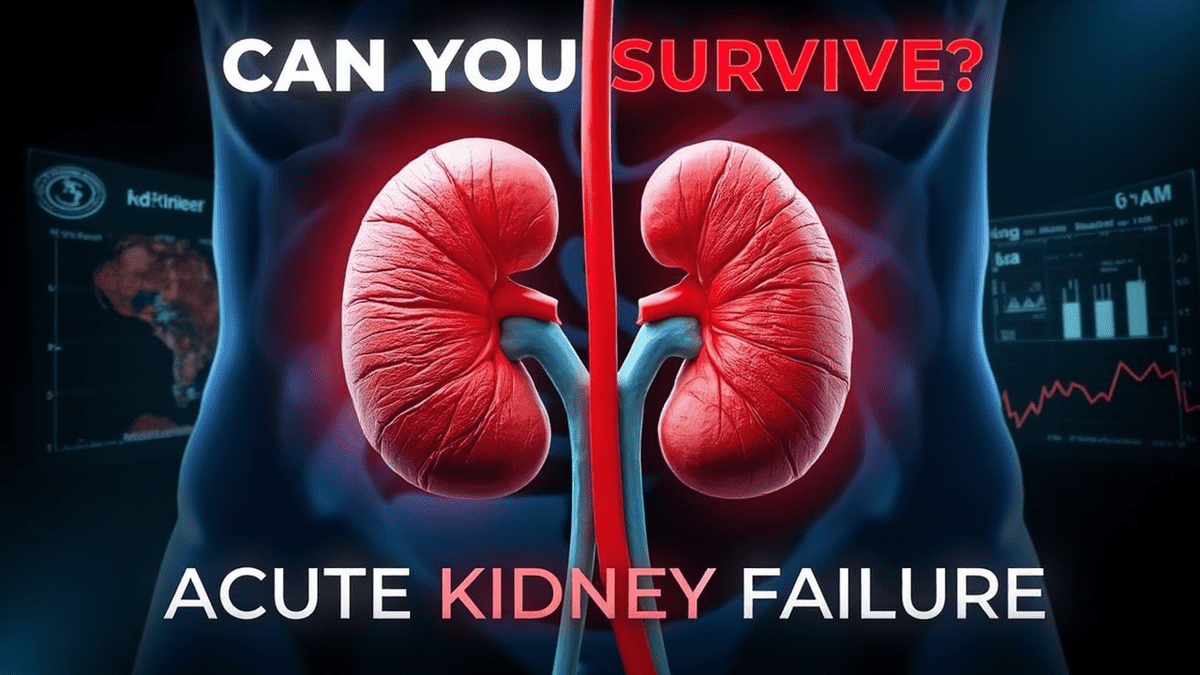Acute kidney failure, also known as acute kidney injury (AKI), is a serious and potentially life-threatening condition. Can you survive acute kidney failure? The good news is that with prompt medical intervention, many people can recover from AKI and return to a healthy, normal life. However, the key to survival depends on several factors, including th
Acute kidney failure, also known as acute kidney injury (AKI), is a serious and potentially life-threatening condition. Can you survive acute kidney failure? The good news is that with prompt medical intervention, many people can recover from AKI and return to a healthy, normal life. However, the key to survival depends on several factors, including the severity of the kidney damage, the underlying causes, and the speed at which treatment is administered.
In this comprehensive guide, we will walk you through the stages, symptoms, and treatments of acute kidney failure. We’ll also provide a clear understanding of how long someone can survive with AKI and answer frequently asked questions related to kidney failure.
What is Acute Kidney Failure (AKI)?
Acute kidney failure is when your kidneys suddenly lose the ability to filter waste products from your blood. This condition can develop rapidly, often within a few hours or days, and leads to a dangerous buildup of waste and fluids in the body.
The kidneys perform several vital functions, such as:
- Filtering waste products from the bloodstream.
- Balancing fluid and electrolytes in the body.
- Regulating blood pressure.
- Producing red blood cells.
Without healthy kidney function, your body cannot perform these essential tasks.
How Long Can You Survive with Acute Kidney Failure?
The question of how long someone can survive with acute kidney failure largely depends on how quickly they receive treatment and how well their body responds. Without proper intervention, AKI can lead to death within days or weeks due to the body’s inability to filter out toxins. However, with early diagnosis and treatment, many people can survive and recover fully.
Typically, if a person’s kidney function falls drastically, medical professionals will work swiftly to provide dialysis or other life-saving treatments. With early and effective treatment, survival rates improve significantly.
What Stage of Kidney Failure is Fatal?
Kidney failure is categorized into stages based on the severity of the condition. Stage 1 is the mildest form, and Stage 5 is considered end-stage kidney failure, where kidney function is severely diminished or lost entirely.
Stage 5 kidney failure is fatal without dialysis or a kidney transplant. However, even at this advanced stage, a person can survive with dialysis, which helps to filter waste and fluid from the blood.
Is Acute Kidney Failure Progressive?
Acute kidney failure is not always progressive. In many cases, it can be reversed with prompt treatment. However, if the cause of the kidney failure is not treated, or if the kidneys are severely damaged, AKI can become chronic, leading to chronic kidney disease (CKD), which is progressive.
How Close is Death When the Kidneys Shut Down?
When kidneys shut down completely, it can be a life-threatening condition. Without immediate treatment, such as dialysis or a kidney transplant, the accumulation of waste and fluid in the body can lead to organ failure and death. Therefore, it is crucial to seek medical care as soon as possible if kidney failure is suspected.
How Fatal is AKI?
Acute kidney injury can be fatal if left untreated. Survival depends on early detection and intervention. With the right treatment, such as dialysis and addressing the root cause of the kidney failure, many people can recover fully.
Has Anyone Ever Recovered from Kidney Failure?
Yes, many people have recovered from kidney failure. Recovery is more likely when AKI is diagnosed early and treated promptly. The survival rate for people who receive timely dialysis and medical care is high, especially in cases where the kidney damage is not severe.
What is the Lowest Kidney Function Before Death?
When kidney function drops to less than 15%, it is considered end-stage kidney failure. This is when dialysis or a kidney transplant is usually needed to sustain life. However, with proper treatment, many individuals can survive even at this stage.
How Long Does it Take to Go From Stage 4 Kidney Failure to Stage 5?
The progression from stage 4 kidney failure to stage 5 kidney failure varies. In some cases, it can take years for kidney function to deteriorate to the point where dialysis or a transplant is needed. However, for others, the progression may be rapid. Timely intervention and kidney-friendly lifestyle changes can slow down the progression.
How Survivable is Kidney Failure?
Kidney failure is highly survivable when diagnosed early and treated appropriately. With modern medical advancements, many people survive acute kidney failure and live long, healthy lives. However, survival depends on how quickly the condition is detected, the underlying cause of the failure, and how effectively it is treated.
How Treatable is Acute Kidney Failure?
Acute kidney failure is treatable, especially if caught in its early stages. Dialysis, medications, and treating the underlying condition (such as an infection or obstruction) can often restore kidney function. If treated promptly, most people can recover from AKI.
What Not to Drink if You Have Kidney Problems?
If you have kidney problems, it’s essential to avoid certain drinks, such as:
- Sugary drinks and sodas can increase blood pressure and worsen kidney function.
- Alcohol should be limited as it can strain the kidneys and dehydrate the body.
- Caffeine in excess can lead to increased blood pressure and kidney strain.
It’s always best to consult with your doctor about safe fluid intake based on your kidney health.
What is the End Kidney Death Act?
The End Kidney Death Act focuses on ensuring that people with kidney failure have access to timely and appropriate care, including dialysis and kidney transplants. The goal is to improve patient outcomes and prevent unnecessary deaths related to kidney disease.
How Serious is Acute Kidney Failure?
Acute kidney failure is a serious condition that requires immediate medical attention. Left untreated, it can lead to organ failure and death. However, with early diagnosis and treatment, many individuals can recover fully.
Summary of Key Points
Here’s a quick summary of the main points discussed in the article:
| Key Points | Details |
|---|---|
| Survival with AKI | Many people survive AKI with timely treatment. |
| Fatal Stages | Stage 5 kidney failure is fatal without treatment. |
| Treatment | Dialysis and treating the underlying cause are key to recovery. |
| Recovery | Many individuals recover fully from acute kidney failure. |
| Dietary Considerations | Avoid sugary drinks, alcohol, and excess caffeine if you have kidney problems. |
Call to Action:
If you or someone you know is experiencing symptoms of acute kidney failure, it’s important to seek medical attention immediately. Early intervention is key to improving survival rates and recovery. Don’t wait—act now to protect your health.
FAQs About Acute Kidney Failure
- Can you survive acute kidney failure? Yes, many people survive AKI with proper and timely treatment, including dialysis.
- What stage of kidney failure is fatal? Stage 5 kidney failure is fatal without dialysis or a kidney transplant.
- Is acute kidney failure progressive? Acute kidney failure can be reversed if treated early. However, untreated AKI may lead to chronic kidney disease.
- How serious is acute kidney failure? AKI is a serious condition that can lead to organ failure and death if not treated promptly.
- Has anyone ever recovered from kidney failure? Yes, many people have recovered from acute kidney failure, especially with early detection and treatment.
Conclusion
Can you survive acute kidney failure? The answer is yes, with the right treatment and early intervention. Acute kidney failure is a serious condition, but it is treatable. The key is recognizing the symptoms early, seeking medical help promptly, and adhering to the prescribed treatment plan. The chances of survival and recovery are high for those who act quickly.
Take care of your kidneys by staying hydrated, avoiding harmful substances, and managing underlying health conditions. Your kidneys play a critical role in your overall health—don’t ignore the signs!
Medlifeguide give information about also kidney diseases, chronic kidney disease (CKD) and also diet plans for kidney health; reach out to acheive these information for your and your family’s health

